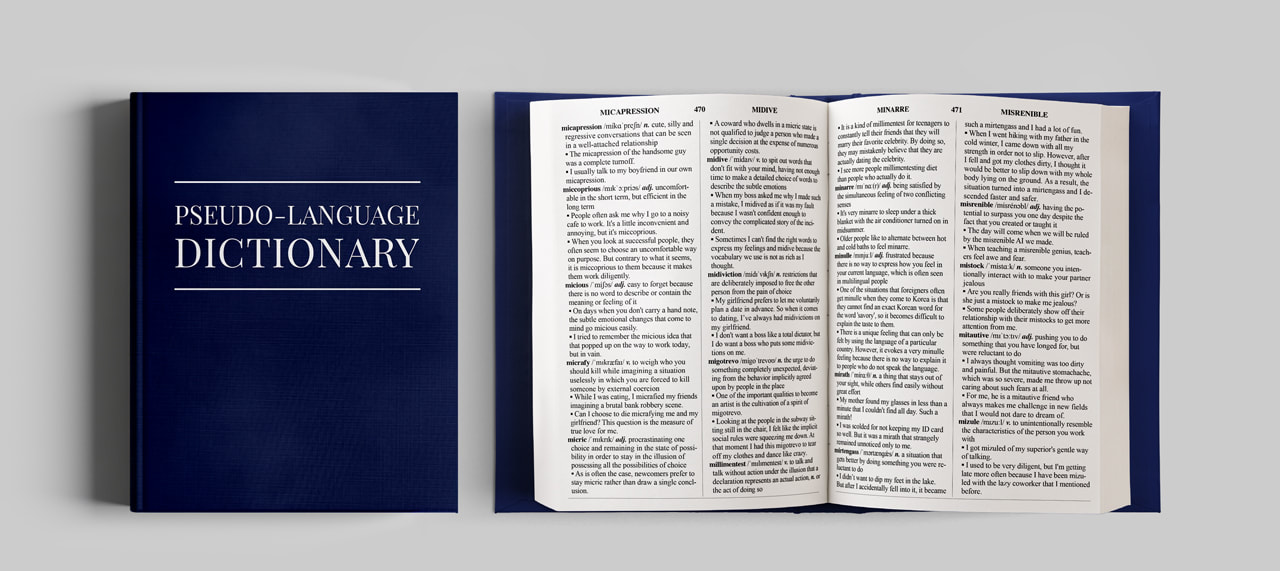|
|
|
aamsphart (ˈæmz.fɑrt) n. the shared communication mechanisms observed in living beings without conventional written or spoken language systems, encompassing diverse non-verbal ways of exchanging information and understanding among such organisms
babbit (ˈbæbɪt) n. the subtle and romantic tension between two strangers in the same space
calmoaudio (ˈkɑːlmoʊˌɔːdioʊ) adj., n. relating to or characteristic of a calm sensory experience primarily focused on auditory stimul as a type of calmosensory
dacalus (deɪˈkæləs) n. the bond between an object and its owner
earthman (ɜːrθmæn) n. a type of person who does not dream of any ideals and pursues only the present happiness thoroughly
fabrate (féibreɪt, ˈfæbreɪt) v. to dislike something just because many people already like it
gammettism (│ɡæmə|tɪzəm) n. a superpower to know where the north is wherever you are
hadin (ˈhɑdin; ˈheɪdin) n. a man of all the knowledge that mankind has accumulated
ibite (ˈiːbaɪt) n. friendship dating for non-gay men
jablix (ˈdƷəblɪks) n. a passionate and active attitude to think from the perspective of the owner
kalamirith (kəlæmɪ'rɪθ) n. a profound sense of insignificance or emptiness experienced when contemplating the vastness of the world from a macroscopic or cosmic perspective
lammour (læˈmʊr) n. subtle appearance competition between lovers
machine rage (məˈʃiːn-reɪdʒ) n. the urge to destroy the machine due to its poor interface or malfunction
nactia (nekʃiə) n. another stage of the day that exists between morning and night when the sky becomes all purple and people begin to act on their latent instincts
obeset (ˈoʊbiset) adj. tired of what you have already accomplished
paful (ˈpeɪfl) adj. feeling rich and happy when there are many episodes you haven't seen in a movie or drama yet
qion (kiːɔn) n. a concept or being that we cannot recognize because we have not experienced its absence.
ranish (ˈrænɪʃ) v. to ignore someone without attracting their attention
sammonas (səˈmɑːnəs) n. enticing bait or triggers to motivate individuals who are reluctant to engage in certain tasks
tablue (ˈtæbluː) adj. used so frequently that its value has faded
Undecided-Eye Syndrome n. a psychological phenomenon that makes it unnatural to stare at the other person because you are confused about which part of the other person's face you usually see
variskys (veˈriskɪːs) adj., n. the feeling you get when you realize that humans are not the only intelligent beings in the universe
washound (wɒˈʃaʊnd) n. the act of showering while wearing earphones to listen to music
xalibruv (zælɪbrʌv) adj. characterized by an immersion in falsehoods and erroneous logic, diverging from objective reality to embrace deceptive language and fallacious reasoning
Yanson (jɑːnsn) n. a company that sells and manages personal identity with permission from the world government
zaptoverge (zæpˈtoʊvɜrdʒ) n. the euphoric sensation derived from impulsively dismantling or destroying something diligently amassed or accumulated. This feeling combines elements of accomplishment, spontaneity, and cathartic release.
3pire (θriˈpaɪər) n. a marriage certificate that expires every three years, reflecting concerns about high divorce rates and outdated marriage laws. Failure to renew leads to automatic divorce proceedings
|
